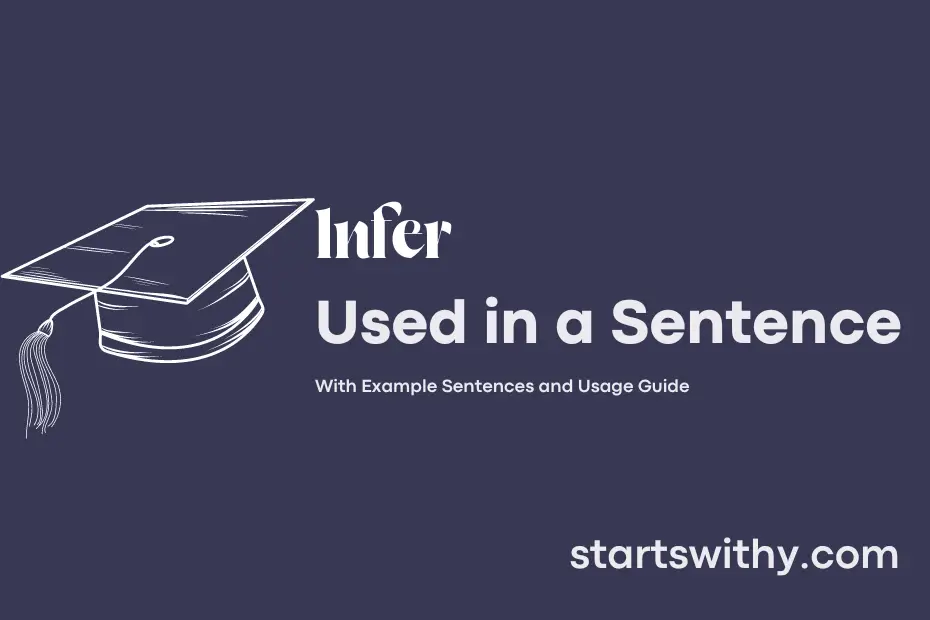Have you ever wondered how to deduce information that is not explicitly stated? This process is known as inference, a cognitive skill essential for understanding texts and drawing conclusions based on evidence presented.
When you infer, you are using context clues, prior knowledge, and hints scattered throughout the material to make educated assumptions about details that are implied but not directly expressed. This ability is crucial in decoding hidden meanings, understanding subtext, and grasping the deeper implications of a given message.
7 Examples Of Infer Used In a Sentence For Kids
- Infer what the animal is by looking at its paw prints.
- Look at the picture and infer which fruit is the biggest.
- Infer the weather today by looking at the dark clouds in the sky.
- Can you infer if the bear is hungry by looking at its growling tummy?
- Infer what color the flower is by looking at its petals.
- Infer how the character is feeling by looking at their facial expression.
- Infer which number comes next in this pattern: 1, 3, 5, _.
14 Sentences with Infer Examples
- Infer the relationship between GDP and unemployment rates in India.
- Can you infer the author’s main argument from this passage?
- By analyzing the data, we can infer which marketing strategy is more effective.
- How can we infer the meaning of this complex mathematical formula?
- Students can infer the cultural significance of traditional Indian art forms through analysis.
- It is important to infer the impact of climate change on India’s agriculture sector.
- By examining the trends, we can infer future patterns in consumer behavior.
- Infer the reasons behind the increasing dropout rates among students in Indian universities.
- Can you infer the implications of the new education policy for college students?
- Through case studies, students can infer the ethical dilemmas faced by Indian businesses.
- Infer the consequences of political instability on the Indian economy.
- By looking at historical data, we can infer the causes of inflation in India.
- Infer the effects of globalization on traditional Indian industries.
- Students are encouraged to infer the societal norms reflected in Indian literature.
How To Use Infer in Sentences?
Infer means to deduce or conclude information based on evidence or reasoning.
Here’s a guide on how to use infer in a sentence:
-
Start by identifying a situation where you need to draw a conclusion based on available information. For example, “Based on the dark clouds in the sky, we can infer that it is going to rain soon.”
-
Next, clearly state the evidence or reasoning that led you to your conclusion. This helps the reader understand why you are making that inference. For instance, “From the footprints in the snow, we can infer that someone has been walking in this area recently.”
-
Make sure to use the word infer appropriately in your sentence. This means using it in a context where you are drawing a logical conclusion from the given evidence. “The detective was able to infer the suspect’s motive from the text messages found on the phone.”
-
Finally, reevaluate your sentence to ensure that your use of infer accurately conveys the process of reasoning or deducing information. “By observing the behavior of the animals, we can infer that they are searching for food.”
Remember, using infer in a sentence involves drawing conclusions based on evidence or reasoning, so make sure your sentence reflects this process accurately.
Conclusion
In conclusion, sentences that involve inferring require readers to draw conclusions or make educated guesses based on the information provided in the text. These sentences often contain hints, clues, or context that allow readers to infer what is being implied or suggested. By analyzing the details presented and reading between the lines, individuals can develop a deeper understanding of the text and its underlying meaning.
Overall, sentences with infer challenge readers to actively engage with the text, think critically, and use their comprehension skills to make reasoned interpretations. By honing the ability to infer, individuals can enhance their reading proficiency and gain valuable insights into the implications and nuances conveyed in written material.



